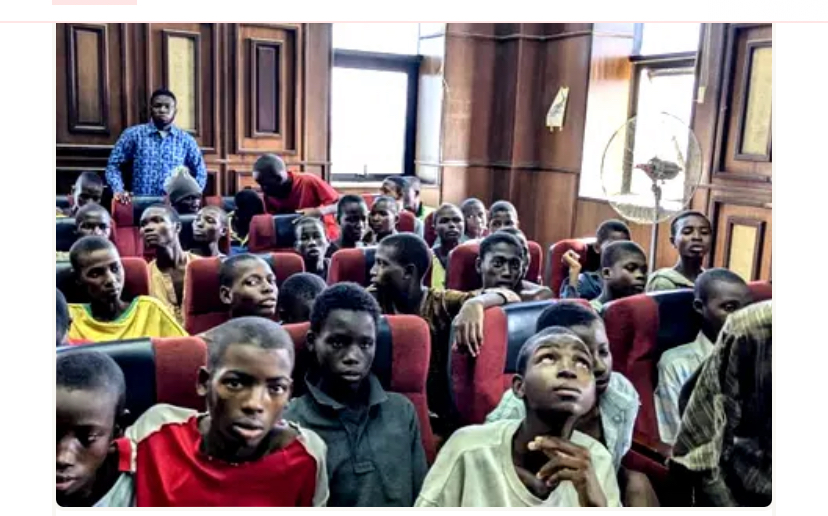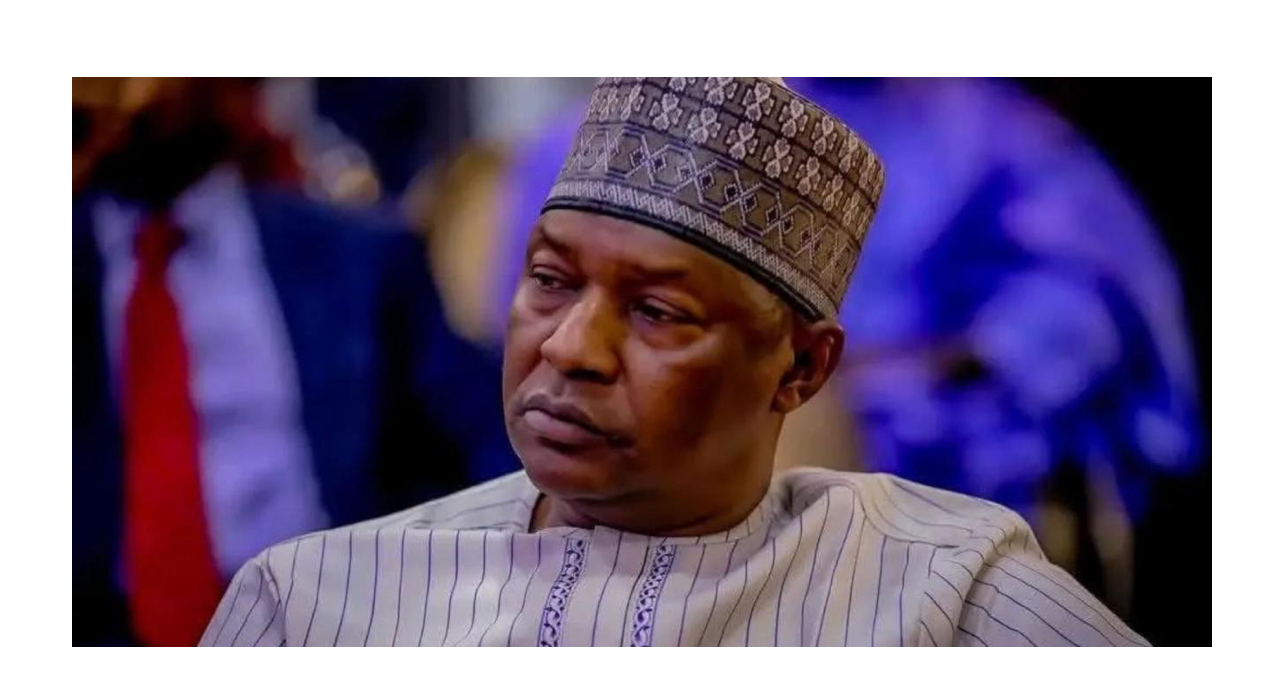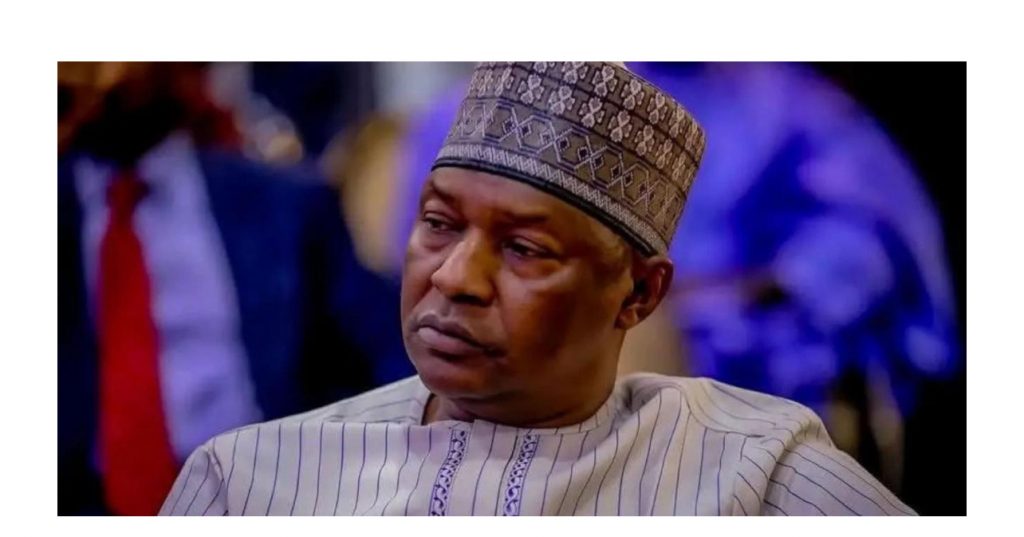news
EndBadGovernance: 72 Minors Arraigned in Court Unconstitutional and Violation of Child Rights, Says Opeyemi Eyuruntari (Saffron SDGF)

 Following the recent public outcry over the court appearance of northern protesters at the Federal High Court in Abuja, Ms. Opeyemi Ebulu-Eyuruntari, Executive Director of Saffron SDGF, has joined others in condemning the federal government’s arraignment of minors, calling it unconstitutional and a violation of child rights internationally.
Following the recent public outcry over the court appearance of northern protesters at the Federal High Court in Abuja, Ms. Opeyemi Ebulu-Eyuruntari, Executive Director of Saffron SDGF, has joined others in condemning the federal government’s arraignment of minors, calling it unconstitutional and a violation of child rights internationally.
The recent incident involving the arraignment of 72 minors on October 11, 2024, has highlighted the concerning use of adult prisons to detain young people, bringing this issue into public focus.
These minors were arrested following the #EndBadGovernance protest in August 2024. The federal government of Nigeria arraigned them, aged 14 to 17, in the Federal High Court in the Federal Capital Territory rather than in a juvenile court.
Saffron SDGF strongly condemns the use of adult detention facilities for minors and asserts that this development has exposed and embarrassed our national judicial system, which is wholly unacceptable.
Ms. Opeyemi Ebulu-Eyuruntari emphasizes that the rights of minors are fundamental and that Nigerian children’s rights must be respected and upheld by all parties involved. She also highlighted how this incident has exposed significant gaps in the nation’s programming for Orphans and Vulnerable Children (OVC) and in the juvenile justice system. This situation, she argued, necessitates an urgent reevaluation of Nigeria’s approach to addressing the needs of children within the justice system.
The Child Rights Act of 2003 mandates that the welfare of the child is paramount. Although Nigeria has a juvenile justice system, it does not meet international standards. The administration of this system has stated that it is essential to treat children in a way that promotes their sense of dignity and worth, taking their age and understanding into consideration. It also advises that efforts should focus on reintegrating children into society, enabling them to play constructive roles within their communities.
The United Nations Convention on the Rights of the Child (1989), to which Nigeria is a signatory, outlines the responsibilities of countries toward minors in the judicial system. Article 37 stipulates that minors have the right to legal representation, which was not provided in this case. Article 12 affirms their right to be heard and taken seriously, which did not occur for these children. Article 19 mandates the right to protection, yet these minors have been held in adult prison since August 2024. Article 40 states that a minor accused of breaking the law should be treated with respect and dignity. This, too, was disregarded, as they appeared in court malnourished, in torn clothing, and without a clear understanding of their alleged crime.
In conclusion, Chief ‘Aare’ Oluwasegun Oyedijo, Strategic Development & Partnership Director, states, “For us at Saffron SDGF, this is a clear violation of state, national, regional, and international legal frameworks concerning children’s rights and the judicial system.”

We urge Nigerians to join Saffron SDGF in advocating for a “National Safeguarding and Child Protection Policy,” alongside actionable procedures to be signed into law. This will establish a national guideline to protect Nigerian children from potential harm and abuse within the legal system.
news
Impeachment Saga : Rivers Chief Judge Acknowledges Assembly’s Submissions Against Fubara


….Gov throws jibe, describes impeachment notice as ‘love letter’
Vows to avoid actions capable of breaching peace
The office of the Rivers State Chief Judge, Justice Simeon Amadi, has received the letter from the State House of Assembly requesting him to constitute a seven-man committee to probe the allegations of gross misconduct leveled against the state Governor, Sir Siminalayi Fubara and his Deputy, Prof. Ngozi Odu.
The House of Assembly Committee Chairman on Petitions, Information and Complaints, Dr Enemi George, confirmed that the Chief Judge had acknowledged receipt of all the documents.
Also received by the CJ’s office were other documents detailing the allegations of gross misconduct against the governor and the deputy governor, copies of the Rivers State Impeachment Panel (Conduct of Investigations) Procedure 2025 and photocopies of The Nation, The Guardian and The Sun, among others.
George said: “It is important to inform the good people of Rivers State that Mr. Speaker has already complied with the Constitution and letters sent by him to the Chief Judge have been received and acknowledged.
“All relevant documents including the Notices of Allegations of Gross Misconduct were attached”.
He added: “Every step going forward, what can happen or what cannot happen is clearly stated in Section 188 of the Constitution.
“The good people of Rivers State should remain calm and should not listen to those who want to truncate our democracy.”
He commended and thanked the good people of Rivers State for their support and prayers for the 10th Assembly in particular and Rivers people at large.
The Rivers State High Court sitting in Oyigbo Local Government Area has however issued an interim injunction restraining the CJ from receiving, forwarding, considering or acting on any request, resolution, articles of impeachment or any form of communication from Speaker Martin Amaewhule and other members of the State House of Assembly for the purpose of constituting a panel to investigate the alleged misconduct against the governor and his deputy.
They just landed me a ‘love letter’, says Fubara
Governor Fubara, in a veiled reference to the impeachment notice, called it a love letter.
“This 2026 that I thought would have been the finest, they just landed me a love letter,” he said while speaking as special guest during the finals of the 2026 Port Harcourt Polo Tournament in Port Harcourt, the Rivers State capital.
He added:”That notwithstanding, we must move on and carry on the responsibilities as a government. We will continue to support everyone who means well for Rivers State.”
He vowed that he would not support, directly or indirectly, any action capable of undermining peace and safety in the state.
He insisted that the protection of lives and property remained the primary responsibility of his administration.
He emphasised that he remained the governor of the state and would continue to deliver on the promises made to the people.
Fubara expressed satisfaction that the 2026 Port Harcourt Polo Tournament was held for one week without any incident.
He described the peaceful conduct of the event as a clear indication that Rivers is safe for residents, visitors and investors.
A supporter of the governor, Amb.Chijioke Ihunwo, asked the assembly members to perform their functions independently.
He pleaded with President Tinubu to intervene on the matter, insisting that the governor had done nothing to warrant his removal.
He said: “This assembly must remain independent to allow peace to prevail in the state.
“Governor Fubara has done nothing to warrant his removal. President Tinubu should intervene in this matter as the leader of the party.”
The high powered committee set up by the Pan Niger Delta Forum (PANDEF) to reconcile the feuding sides in the Rivers imbroglio is said to be working round the clock to stop the planned impeachment.
The committee members have already met with Federal Capital Territory (FCT) Minister Nyesom Wike in Abuja and separately with Fubara and some other stakeholders.
news
Alleged Arms Discovery: Malami Faces DSS Probe as EFCC Denies Victimisation


Economic and Financial Crimes Commission (EFCC) chairman Ola Olukoyede has faulted the persecution claim by the immediate-past Attorney-General of the Federation and Minister of Justice, Mallam Abubakar Malami (SAN).
He described it as unfortunate that some Nigerians were buying into the narrative when Malami’s probe started before his appointment.
Malami is standing trial alongside some family members on 16 counts of money laundering involving about N8.7 billion.
Speaking on a national television yesterday, Olukoyede dismissed Malami’s claim of vendetta against him, saying the commission has not wavered in investigating and prosecuting those suspected to have been involved in corruption cases.
“There’s nothing like that. The particular case predated my appointment. And, I didn’t give a nod to initiate proceedings until I found that we have a water-tight investigation,” he said.
The EFCC boss denied being indicted by Justice Ayo Salami’s panel.
Olukoyede said: “I challenge those making such claims of indictment against me by Justice Ayo Salami Panel to publish the report.
“Let me tell Nigerians that the commission’s investigation panel cleared me of any wrongdoing. The presidency at the time also cleared me. Also, the law enforcement agencies handed me a clean bill.
“I can say clearly that there’s no report anywhere that I’ve been involved in any fraudulent dealings, whether as the commission’s chief of staff, secretary, and now, the chairman of the commission.”
Noting that the commission, under his watch, made notable achievements last year, he said: “Our big win in 2025 was our ability to review and revive old cases that Nigerians thought were dead.
“Some of the cases affect past governors and ministers, and many such cases are in courts.
“We were able to recover assets. Nigerians are aware of the Lokogoma assets. One major recovery was a university.”
The EFCC recovered Nok University in Kachia, Kaduna, after a court ordered its final forfeiture because it was built with stolen public funds by a former civil servant.
It was converted to the Federal University of Applied Sciences,
Immediate-Past Attorney-General of the Federation and Minister of Justice, Mallam Abubakar Malami (SAN), is facing a fresh investigation over the arms and ammunition found in his house.
Newsthumb learnt that the arms were uncovered at his Kebbi country home by the operatives of the Economic and Financial Crimes Commission (EFCC) during a search.
The anti-graft agency, it was further learnt, handed them over to the Department of State Service (DSS) for a comprehensive probe because it is not within its remit to do so.
The number of arms and ammunition could not be immediately ascertained, but it was gathered that they are high in number to attract a full DSS investigation.
Malami, who was granted bail last week along with his sons – Abdulaziz, Abiru-Rahman, and others – is still in the Kuje correctional centre, having been unable to perfect his bail conditions.
But, sources said he might be taking things slowly to stall the DSS investigation into the weapons found in his house.
“The former minister is being separately investigated for allegedly having arms in his house in Birnin Kebbi. The inventory of the shock find has been handed over to the DSS.
“It is now left to Malami to explain to the DSS how he came about the arms. That’s why he is yet to perfect his bail conditions. He is holed up in prison to avoid arrest by the DSS.
“DSS operatives are within the precincts of Kuje Correctional Service to invite Malami. He got wind of their presence and raised the alarm. But the law must take its course.”
Another source within the EFCC said Malami had yet to meet his bail conditions.
“By our records, the ex-AGF is still in custody. We saw all manners of fake clips on social media on his purported arrival and rousing reception in Kebbi State,” the source said.
The source added: “The investigation into Malami’s activities during his tenure began when former EFCC Acting Chairman Ibrahim Magu was in office.
“Investigation continued through the administration of another Acting Chairman, Ibrahim Chukkol, to the present Executive Chairman. Chukkol, who works in the agency, was in charge briefly before Olukoyede’s appointment.
“There is nothing vindictive about his investigation since 2019. It is an inherited case, and the ex-AGF knows this.”
Olukoyede confirmed that he inherited the Malami case during an interview last night on a national television.
A Federal High Court in Abuja last week ordered the interim forfeiture of 57 assets linked to Malami and his two sons.
The assets have been valued at N213, 234,120,000.
The court has, however, given Malami and the sons or any other claimant a 14-day leave to show proof that the assets were legally acquired.
Failure to present legitimate claims within 14 days may lead to the permanent loss of the assets to the Federal Government.
The court’s order was based on the invocation of the Non-Conviction Asset Forfeiture Clause in the EFCC Establishment Act.
The EFCC had applied to the Federal High Court to seize the suspicious properties in Abuja, Kano, Kaduna, and Birnin-Kebbi.
news
₦213 Billion Worth of Properties Seized from Malami in Money Laundering Probe: Full List of 57 Luxury Homes and Hotels


Presiding Judge, Justice Emeka Nwite, granted the order on Tuesday, January 6, 2026, following an ex-parte motion filed by EFCC counsel, Ekele Iheanacho (SAN).
A Federal High Court in Abuja has ordered the interim forfeiture of 57 properties linked to former Attorney-General of the Federation and Minister of Justice, Abubakar Malami (SAN), and two of his sons, Abdulaziz and Abiru-Rahman Malami.
Presiding Judge, Justice Emeka Nwite, granted the order on Tuesday, January 6, 2026, following an ex-parte motion filed by EFCC counsel, Ekele Iheanacho (SAN).
The assets, valued at ₦213.2 billion, include multi-billion naira landed properties spread across Abuja, Kebbi, Kano, and Kaduna States. The court ruled that the assets are suspected to be proceeds of unlawful activity.
The 57 properties are as follows:
1. Luxury Duplex at Amazon Street, Plot No. 3011 Within Cadastral Zone, A06 Maitama; File No: AN enhancement 11352, which was purchased in December 2022 at N500, 000, 000.00 (value after enhancement at N5,950,000,000).
2. Two Winged Large Storey Building Situate at No. 3, Onitsha Crescent, Area 11,Garki, Cadastral Zone, A03, Abuja (formerly Harmonia Hotels Limited), FCT, which was purchased Dec. 2018 at N7,000,000,000.
3. Plot 683, Jabi District, Cadastral Zone B04, Comprising of a five storey Building (Now Luxurious Meethaq Hotels Ltd, Jabi with 53 rooms/suites), which was purchased in Sept. 2020 at carcass level at N850,000,000 with additional N300,000,000 to take possession (value after completion N8,400,000,000).
4. Property No. 3130 within Cadastral Zone A04, Asokoro District, FCT, Abuja, Comprising Terraces, purchased in January 2021 at N360,000,000.
5. Property No. 3 Rhine Street, Maitama, Abuja (Meethaq Hotels Limited, Maitama With 15 ROOMS), which was purchased in February 2018 at N430,000,000 (current value after rehabilitation is N12,950,000,000).
6. Plot No. 1241B, Asokoro District Zone (No. 11A Yakubu Gowon Crescent) AsokoroDistrict, which was purchased in July 2021 at N325,000,000.
7. Shop No. C82 Citiscape — Shariff Plaza, Plot 739 Cadastral Zone A07, Aminu Kano Crescent, Wuse Il, FCT, Abuja, which was purchased in March 2024 at N120,000,000.
8. No. 4 Ahmadu Bello Way, Nasarawa GRA, Kano, which was purchased in December 2022 at N300,000,000.
9. Plot 157, Lamido Crescent, Nasarawa, GRA, Kano, purchased in July 2019 with no specific amount stated.
10. A Plaza, Commercial Toilets, Laundering, Warehouse Tanks Adjacent to Birnin Kebbi Market at N100 million.
11. 100 Hectares of l;and Along Birnin Kebbi, Jega Road, which was purchased in 2020 at N100,000,000.
12. Four Bedroom Bungalow Gesse Phase, Birnin Kebbi, which was purchased in 2023 at N101,000, 000.
13. Shops Nos. A36, B3 Vegas Mall, Wuse 2, Abuja, which was purchased in July 2023 at N158,000,000.
14. No. 26, Babbi Drive, Bua Estate, Abuja, purchased in 2022 at N136,000,000.
15. No. 27, Efab Estates Avenue, 5th Avenue, 59th Crescent, Gwarimpa, Abuja, purchased in January 2016 at N120,000,000.
16. Four Bedroom/ 2 Rooms Boys Quarters at No. 10B, Doka Crescent Abakpa GRA, Kaduna, purchased in January 2018 at N40, 000, 000.00.
17. Plot No. 13, Ipent 7 Estate, Karsana District, Abuja, purchased in June 2018 at N85,000,000.
18. A Bedroom Duplex & Boys Quarters at No. 12 Yalinga Street, Off Adetokunbo Ademola Crescent, Wuse Il, Abuja, purchased in Oct. 2018 at N150,000,000.
19. Two Warehouse Shops B40 And B46, Wuse Market, Abuja, purchased in July 2020 at N50,000,000.
20. Twin Houses at Zone E, Apo Legislative Quarters, Cadastral Zone B01, Plot 14014, Gudu District, Abuja, was purchased between February and May 2017 at N250,000,000.
Properties acquired by Khadimiyya for Justice & Development Initiative at the Academic Garden City, Birnin Kebbi, sold by the Federal Housing Authority Mortgage namely.
21, 22, and 23. Nine units of three bedroom, bungalow, three units of two bedroom bungalow, and 5.4 hectares of land, which were purchased between February 2023 and September 2023 at N187,000,000, among other assets listed in the schedule.
RAYHAAN UNIVERSITY, KEBBI STATE
24. Rayhaan University Permanent Site -N56,000,000,000.00
25. Rayhaan University Temporary Site -N37,800,000,000.00
26. Rayhaan University Third Site – N2,450,000,000.00
27. Rayhaan University Vice Chancellor – N490,000,000.0
RAYHAAN AGRO ALLIED FACTORY IN KEBBI STATE
28. Factory Buildings -N4,200,000,000.00
29. Factory Machines and Plants Units -N10,500,000,000.00
30. Factory Mosque – N2,450,000,000.00
31. Rayhaan Mill Staff Quarters –
N1,487,500,000.00
32. Rayhaan Bustan Building –
N3,150,000,000.00
AZBIR ARENA KEBBI STATE
33. Azbir Hotel – N10,325,000,000.00
34. Printing Press – N1,050,000,000.00
35. Gallery –
N581,000,000.00
36. Gardens –
N392,000,000.00
37. Mosque -N252,000,000.00
38. Azbir Clothing –
N350,000,000.00
39. Azbir Pharmacy and Supermarket – N175,000,000.00
OTHER PROPERTIES HELD IN KEBBI STAT
40. Al-Afiya Energy Tanker Garage opposite Rayhaan University Health Centre, along Sani Abacha Bypass Road, Birnin-Kebbi – N2,450,000,000.00
41. Rayhaan Model Academy -N11,200,000,000.0
42. Rayhaan Primary and Secondary School –
N8,750,000,000.00
43. Rayhaan Security House, off Sani Abacha Bypass, Birnin Kebbi –
N245,700,000.00
44. Rayhaan Radio along Sani Abacha, Bypass Road, Birnin, Kebbi – N245,700,000.00
45. Uncompleted 2 Storey Complex Plaza located opposite Central Motor Park, (Eastern Park) Birnin Kebbi – N78,750,000.00
46. Amasdul Oil and Gas Ltd filling station Structure along Sani Abacha Bypass, Road, Birnin Kebbi near Jambali Automobile Workshop, Birnin Kebbi – N665,000,000.00
47. Malami Support Organization Building –
N210,000,000.00
48. ADC Kadi Malami Foundation Building – N56,000,000.00
49. Abubakar Malami SAN’s House GRA – N350,000,000.00
50. Abubakar Malami SAN’s House Behind Mobil – N490,000,000.00
51. Abdulaziz Malami (First Son’s House) at Gesse Phase II in Birnin Kebbi – N1,659,000,000.00
52. Abiru-Rahman Abubakar Malami (Second Son’s House) at Gesse Phase II in Birnin-Kebbi – N2,989,000,000.00
PROPERTIES IN KANO
53. Assets of Zeennoor Hotel at Kabuga Satellite Town, off Gwarzo Road, Kano with 131 rooms –
N11,200,000,000.00
54. Zeennoor Mosque at Kabuga, Satellite Town, off Gwarzo Road, Kano – N84,000,000.00
55. Zeennor Old Hotel Building -N280,000,000.00
56. Rayhaan Hotel, Kano Located at Plot 27/28 Opp-Aminu kano Teaching Hospital, Southern Kano (Land And Luxurious Building of more than 50 rooms, with appurtenances- N2,240,000,000.00
57. Rayhaan Gym, Kano House Comprising of a Storey Building Opposite Rayhaan Hotel – N1,225,000,000.00
-

 news5 years ago
news5 years agoUPDATE: #ENDSARS: CCTV footage of Lekki shootings intact – Says Sanwo – Olu
-

 lifestyle6 years ago
lifestyle6 years agoFormer Miss World: Mixed reactions trail Agbani Darego’s looks
-

 health5 years ago
health5 years agoChairman Agege LG, Ganiyu Egunjobi Receives Covid-19 Vaccines
-

 lifestyle4 years ago
lifestyle4 years agoObateru: Celebrating a Quintessential PR Man at 60
-

 health6 years ago
health6 years agoUPDATE : Nigeria Records 790 new cases of COVID-19
-

 health6 years ago
health6 years agoBREAKING: Nigeria confirms 663 new cases of COVID-19
-

 entertainment12 months ago
entertainment12 months agoAshny Set for Valentine Special and new Album ‘ Femme Fatale’
-

 news8 months ago
news8 months agoBREAKING: Tinubu swears in new NNPCL Board


